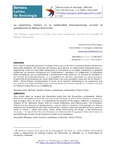La experiencia barroca de la modernidad latinoamericana: entorno al pensamiento de Bolívar Echeverría

Ver/
Use este enlace para citar
http://hdl.handle.net/2183/22587
A non ser que se indique outra cousa, a licenza do ítem descríbese como Atribución-CompartirIgual 3.0 España
Coleccións
Metadatos
Mostrar o rexistro completo do ítemTítulo
La experiencia barroca de la modernidad latinoamericana: entorno al pensamiento de Bolívar EcheverríaTítulo(s) alternativo(s)
The baroque experience of Latin American modernity : around the thought of Bolívar EcheverríaAutor(es)
Data
2017Cita bibliográfica
Revista Latina de Sociología,2017,7(2):1-16.ISSN: 2253-6469
Resumo
[Resumen] Este artículo pretende presentar el trabajo teórico que el filósofo ecuatoriano Bolívar Echeverría desarrolló alrededor del concepto del barroco para pensar la modernidad latinoamericana, y argumentar sobre su valor para comprender la actualidad de la región. Asimismo, se propone evidenciar un entorno conceptual que fundamenta y enriquece su indagación, al relacionar dicha teorización con sus influencias e interlocutores más cercanos –la Escuela de Frankfurt y los teóricos de la descolonización‒, y a ejemplificar en diversos momentos sus apreciaciones y el potencial de las mismas con casos específicos y lecturas paralelas, como son las de James C. Scott y Franz Fanon. Introduciendo al lector en el universo echeverriano, se argumenta que sus aportes son imprescindibles para acercarse desde las ciencias sociales y la filosofía a lo que es América Latina hoy en su complejidad [Abstract] This article aims to present the theoretical work that the Ecuadorian philosopher Bolívar Echeverría developed around the concept of the baroque to think Latin America`s modernity, and to argue about its value to underestand the present of the region. Likewise, it proposes a relation of the aforesaid theory with its closest influences and interlocuters ‒the Frankfurt School and the theorists of decolonization‒, and an effort to illustrate with examples in diverse moments his assessments and their potential with specific cases and parallel lectures, such as those of James C. Scott and Franz Fanon. While introducing the reader to the echeverrian universe, it is argued that his contributions are indispensable to approach from social sciences and philosophy to what Latin America is today in its complexity
Palabras chave
Barroco
América Latina
Capitalismo
Modernidad
Teoría crítica
Baroque
Latin America
Capitalism
Modernity
Critical theory
América Latina
Capitalismo
Modernidad
Teoría crítica
Baroque
Latin America
Capitalism
Modernity
Critical theory
Versión do editor
Dereitos
Atribución-CompartirIgual 3.0 España
ISSN
2253-6469






